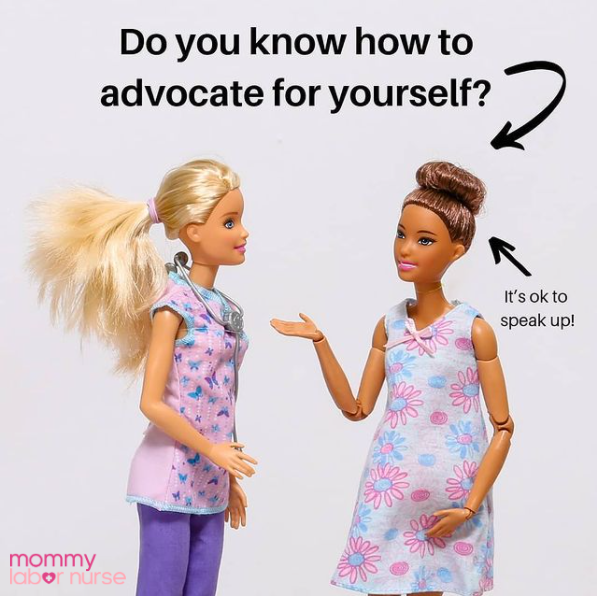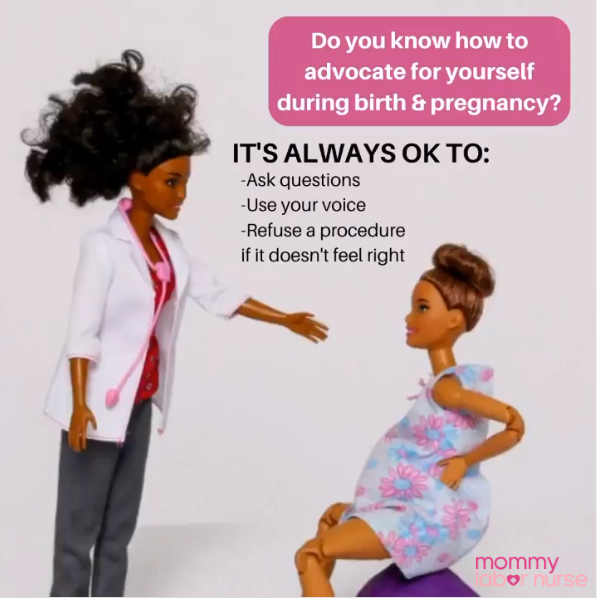When it comes to care during pregnancy, from your first prenatal appointment through birth and postpartum, it is SO important to be your own advocate.
As mamas, we often hear about finding a great provider and a birth team that aligns with our wishes. But today I want you to start thinking of YOURSELF as a key member of your care team.
In my role as a labor and delivery nurse, advocacy is something I see every day. I advocate on my patient’s behalf AND encourage mamas to advocate for themselves if something doesn’t feel right.
But sadly, I don’t see all care providers advocating for what their patient wants, and I don’t see equal opportunity for advocacy among all women. Women of color are tragically silenced, which results in dire outcomes far too often.
Today, I want to discuss actionable ways that you can educate and advocate for yourself throughout pregnancy and birth and shed some light on the tragic black maternal death rates in the US – because it NEEDS attention!
Follow @mommy.labornurse on Instagram to join our community of over 650k for education, tips, and solidarity on all things pregnancy, birth, and postpartum!
Why is it important to prepare to self-advocate?

No mama should be a passive pawn in pregnancy and birth, simply going through the steps and checking the boxes of recommended care. Instead, I want to prepare you to take an active role in your care and advocate for yourself every step of the way.
Because you know what mama? Only YOU know exactly how you’re feeling – whether that’s physically or mentally, and you hold the greatest power to have your needs met if you know how to advocate.
Here I’ve broken down concrete ways you can advocate for yourself during birth and pregnancy. You’ll see that some of the suggestions involve research and education, others do involve surrounding yourself with people that make you comfortable, and many of them are simply about speaking up and using your most important tool – your unrelenting voice.
Black maternal death rates
In the US, black moms are 3-4 times more likely to die from pregnancy-related complications than white moms. Yes. You read that right. And quite frankly, it’s unacceptable.
A pregnancy-related death (or pregnancy-related mortality) is any death of a woman during or within one year of her pregnancy that was caused by a pregnancy-related complication. This could be a chain of events that started with pregnancy OR when pregnancy causes other (unrelated) conditions to worsen, resulting in death.
Let’s look at the numbers
In 2018, the CDC published new data based on all births from 2007-2016 on the maternal mortality (that is, pregnancy-related deaths) in the US. Here’s a quick overview to help you better wrap your head around what I’m talking about:
- ALL live births: 17.4 deaths per 100,000 births
- Maternal deaths in black women: 40.8 deaths per 100,000 births
- Maternal deaths in white women: 12.7 deaths per 100,000 births
As you can see that’s more than TRIPLE, and these statistics do not include women who died MORE than 42 days after giving birth, women over 45, and death from suicide or drug overdose, which can often be linked to pregnancy and childbirth.
View this post on Instagram
What’s more, as the maternal age increases, the disparity increases, and education plays an impact, too:
- In women over age 30, black (and American Indian) women were 4-5 times more likely to die from a pregnancy-related complication
- And black and American Indian women with a college degree were 5.2 times more likely to die from a pregnancy-related complication than white women with the same level of education
To the women of color reading this article
Sadly, this is a STAGGERING, and very real statistic that exists here in the US. My hope is that helping to bring attention and awareness to the issue will help spark change.
If you are a woman of color, it is NOT my intention to raise your anxiety around birth – the other huge motivator in why I’m including this info, and why I wrote this article in general, is because I want to offer solutions to you that you can put into action right away!
Let’s unpack this a little more.
Why is this tragedy a reality in the US?
Though there is no clear explanation as to why, clearly SOMETHING is going on. Experts are weighing in and looking for ways to reduce these gaps.
We believe that it is a combination of issues, including:
- Institutional racism in society & the healthcare system
- Black women’s increased susceptibility to certain health conditions that can affect morbidities in pregnancy
- Lack of access to quality prenatal care – significant underinvestment in family support and health care programs contribute to the alarming trends in maternal health
A brief explanation of structural racism and the weathering hypothesis
Structural racism in healthcare means that black people often receive poorer quality care. It means denial of care when black people seek help when enduring pain or that healthcare providers fail to treat them with dignity and respect due to their own racial biases.
These stressors, and the cumulative experience of racism, trigger a chain of biological processes, known as weathering, which cause a deterioration in the physical and mental health of black people. This same phenomenon is also hypothesized to explain why certain health conditions are far more prevalent in the black community!
The long-term psychological toll of racism puts black women at higher risk for a range of pregnancy-related health conditions including preeclampsia, embolisms, & mental health conditions.
MOST importantly what can we DO about it in healthcare?
1. Improve access to critical services
- Strengthen existing health programs and support reproductive health care
- Screen and treat women at risk for preterm birth
- Eliminate maternity care deserts
- Offer black women tools to navigate the health care system
2. Improve the quality of care provided to pregnant women:
- Train providers to address racism and build a more diverse health care workforce.
- Create standardized assessments for mothers and infants.
- Adopt new models of care and link payment to quality.
3. Address maternal and infant mental health:
- Identify barriers to accessing maternal mental health services.
- Dismantle care barriers with a comprehensive approach.
- Screen for and address infant and early childhood mental health issues.
4. Enhance supports for families before and after birth:
- Invest in and expand access to policies and programs that support families’ basic needs.
- Invest in community programs that offer one-stop comprehensive services.
- Simplify enrollment across public benefit programs.
- Invest in home visiting.
- Fund community-based education and communication initiatives to support families.
5. Improve data collection and oversight:
- Standardize birth and death certificate data.
- Mandate and fund fetal and infant mortality review committees.
- Ensure equity in the review process
And to black women currently pregnant or who’ve recently given birth: be your own #1 advocate!
Until this larger, systemic changes get a foothold, you’ve got to be your own number one advocate.
Like I said, I talk about this for all mamas, but right now – I’m specifically addressing the black mamas out there!
Here’s a quick glance at what you can do:
- Switch practices (if able) if you feel you aren’t being treated right
- Use your voice, continue to advocate for yourself during pregnancy & birth
- Take a birth course – the more educated YOU are, the more confident you’re going to feel to speak up
- Hire a doula or seek out a doula-volunteer program. Doulas have been shown to increase patient satisfaction rates, lower stress AND decrease C-sections
- Use the other suggestions in this article, every single one is going to help you take control
Advocacy in action: 23 ways YOU can advocate for yourself during birth, pregnancy and postpartum

Women who are educated about how to advocate for themselves have a MUCH higher likelihood of having a positive birth experience! That’s because you feel more empowered and educated going into your birth!
First off, advocating for yourself (whether it’s during pregnancy or any aspect of your life) is NOT being outspoken, or pushy. There’s a difference between being assertive and being confrontational.
There’s a difference between:
“I understand you would prefer to have me labor in the bed, but I am low risk and I would prefer to labor standing up as long as everything is ok with baby.”
And,
“F*ck you lady, you can’t tell me what to do, I’m standing up!”
If something doesn’t sit well with you – it’s OK to speak up about it, and I encourage you to do so! Here are some concrete ways to advocate for yourself, broken down into pregnancy, birth and postpartum:
Ways to self-advocate during pregnancy:
- Choose a provider that makes you comfortable: This means they listen to you and perhaps more importantly, make you feel HEARD. Their values and philosophies align with the prenatal care and birth you envision and overall give you a good vibe. Remember, you can switch providers at ANY point in your pregnancy, for ANY reason. And you don’t owe anyone an explanation. (learn about Midwives vs. OBGYNs to help with this)
- Partake in prenatal care: The act of actually partaking in the recommended prenatal care schedule alone decreases your risk of pregnancy-related complications. So even if you’re classified as “low-risk” please, please don’t skip out on prenatal care! The screenings we do at each prenatal appointment can truly save your life should something come up
- Understand your risk factors: During your first (or next!) prenatal appointment, have an in-depth conversation with your provider about your risk factors. Things like age, race, pre-pregnancy weight/BMI, family history and pre-existing conditions all play a role in your risk of complications. Understanding these for yourself and what they really mean can better prepare you to spot red flags and voice concerns
- Ask lots of questions: Yes, yes, yes! Question everything and get curious about your care! We’ve LITERALLY heard it all, and a good provider will welcome your interest in your care. If they don’t – seriously consider switching, mama
- Create a birth plan and talk about it: Birth plans are something I always mention with a caveat that things simply can’t always go as planned, but the act of creating a birth plan is SO powerful because it sparks dialogue with your provider and gets you more educated and confident about birth which leads to better self-advocacy
- Take a birth course: Building on the last point, childbirth education might be the single best way to prepare to advocate during birth, pregnancy, AND postpartum. A thorough understanding of it all is key. It’s actually a big reason that I keep my online childbirth class very affordable – I want as many mamas to gain this knowledge as possible
- Ask about standard practice and policies before you’re due: This is things like when do they recommend C-sections, when do they recommend inductions, what are their rooming-in policies for baby, is skin-to-skin care regularly practiced, do they follow a family-centered care model. Understanding these ahead of time will REALLY help you advocate more effectively when it’s go-time
- Remember that you can refuse literally anything: Yes! This is so important. But please hear out the pros and cons and let your providers weigh in before making a rash decision
Ways to self-advocate during birth:
- Speak up about your pain: Pain and pain tolerance are unique and individualized experiences. NO ONE else gets to decide if your pain level is less than what you say it is. If your pain isn’t being taken seriously, continue to speak up about it
- Talk about your fears and anxieties: Guys, as a labor and delivery nurse I can’t tell you how important this is! Mental blocks are SUCH A HUGE THING. Speaking up about these things in advance or when they happen in real-time is SUCH an important form of self-advocacy because a good care provider will alter their practice/approach (if possible!) if you let us know these things are going on!
- Remember that you are a member of your birth team: Never ever forget that you have a voice in your care.
- Include yourself in decisions but remember to listen, too: At the end of the day, you can refuse anything, but if you’ve taken the time to choose a good provider, and a hospital/birthplace that you’re comfortable with, hear them out!
- Have your own support people advocating, too: Partners can be a wonderful source of advocacy and support during birth. Make sure you get them in on the childbirth education and have some discussions about your birth wishes before the big day
- Question things that don’t feel right in your gut: I said it earlier and I’ll say it again, question everything and anything
How to advocate during postpartum and beyond:
- Only YOU get to decide if you experienced birth trauma: Yep. It’s true. If you are holding on to negative feelings associated with your birth, you may have experienced birth trauma – and I encourage you to talk to your provider or a therapist! Holding onto these feelings can affect you for the rest of your life
- Discuss your birth and tell your story: This can help you work through any potential trauma and help your experience feel more real. Many women describe birth as an out of body experience, and it is typically very private, so telling the story can help SO much with processing no matter how the birth played out
- If something doesn’t seem right with your healing, keep bringing it up: Again, this falls under you knowing your body best, and not letting anyone silence you if you think something’s off
- Advocate for newborn care in the hospital that makes you feel comfortable: Whether that’s rooming-in, using the nursery, delaying care procedures, having care procedures done right away, you get the idea – don’t be pressured by the hospital norms! Learn about these ahead of time so you can have an idea of what’s going to make you feel comfortable
- Utilize the lactation consultants and ask lots of breastfeeding questions: If you plan to breastfeed, I highly recommend hitting up the lactation consultant as much as possible during your hospital stay! They are such a valuable resource in the first few days. Ask them to check baby’s latch (again and again!), ask them to watch a feeding (and another and another), ask them ALL the questions, and don’t leave the hospital without a final check-in
- If something doesn’t seem right with breastfeeding speak up: If it hurts, makes you nervous, ANYTHING, bring. it. up. It’s why they’re there!
- Put your foot down about exclusive breastfeeding if that’s important to you: Yup! Don’t get pressured into supplementing if there isn’t a true sign of low supply or danger to baby (but DO listen to all of their points if this is suggested and keep an open mind that it may be necessary)
- On the flipside, put your foot down if you DON’T want to breastfeed: Equally as important!! Don’t feel pressured to exclusively breastfeed if it doesn’t feel right for you
- Continue to advocate for your own care and your baby now and always <3
Remember, you have a voice!

Wrapping up, if you don’t like the way something is done, you have questions, or you just don’t feel like you are being treated fairly, SPEAK UP!
It’s OKAY to be assertive, and it’s OKAY to advocate for yourself, in fact, you SHOULD advocate for yourself! Providers, nurses, or any member of your healthcare team DON’T always know exactly what’s best for you, and YOU are an important part of the healthcare team too!
It’s IMPORTANT to educate yourself about birth & know what you do and don’t want, and it’s also IMPORTANT to LISTEN to your provider if he/she is suggesting something you are wary of.
Listen, understand the pros and cons, and then BOTH come to a decision that you both feel comfortable on!
And, above all, trust your gut!
Sources:





